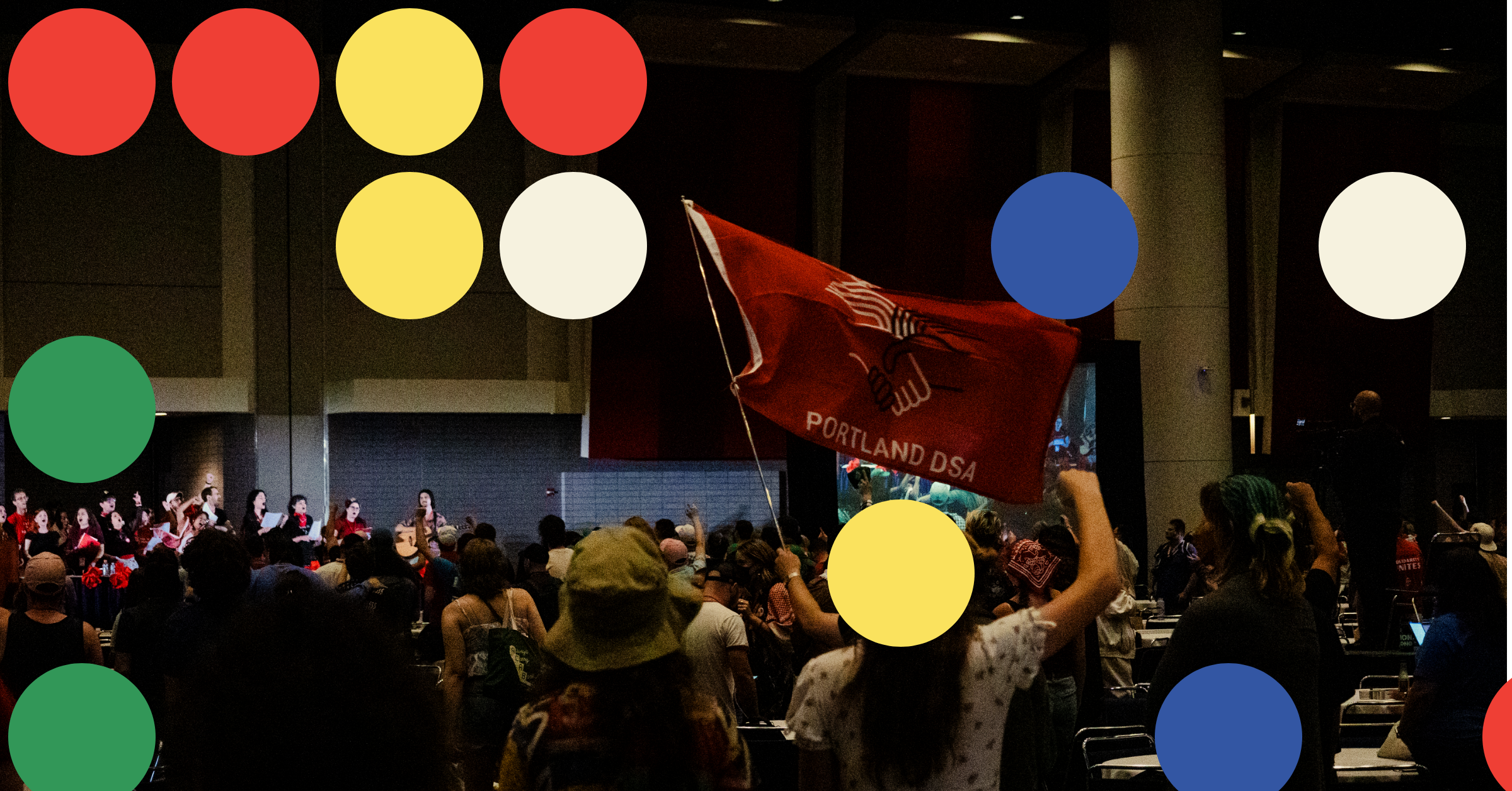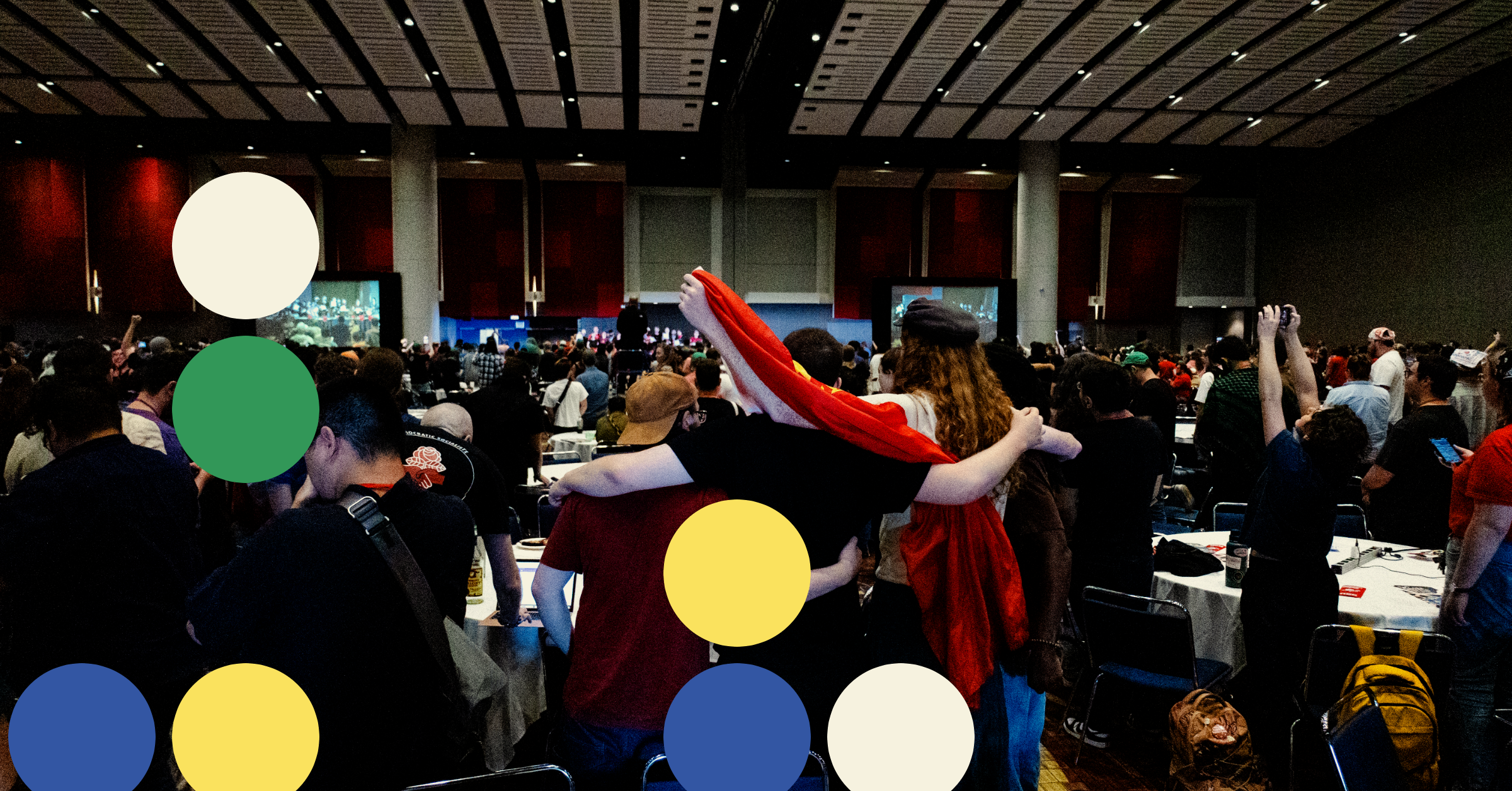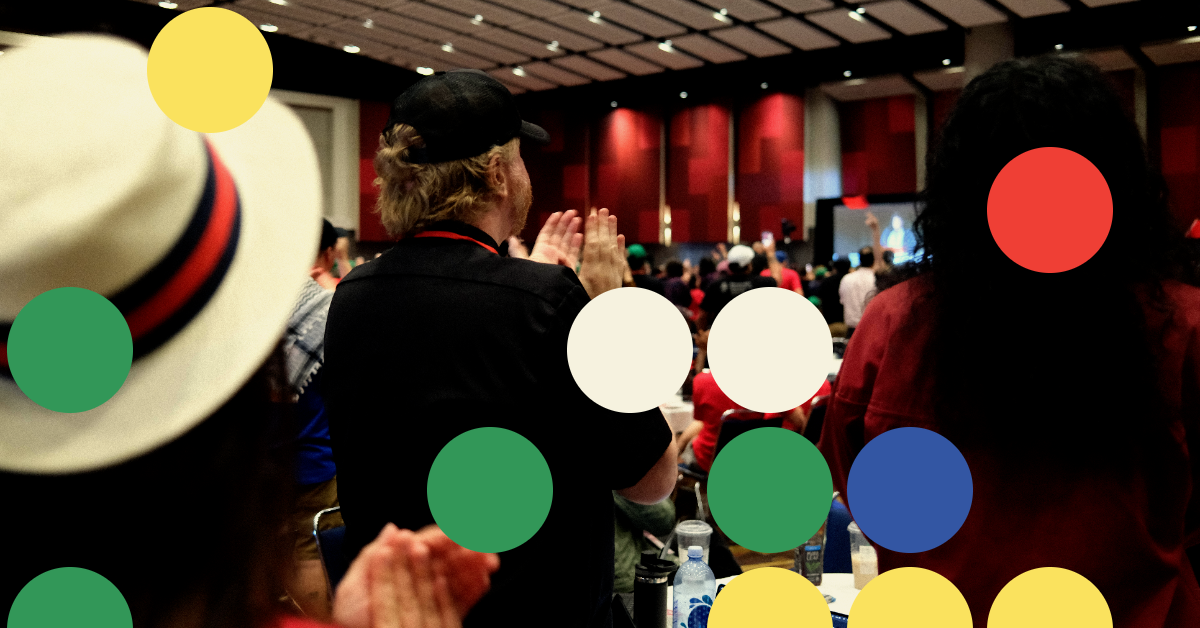What is a Caucus?
A caucus is simply a subgroup of like-minded people in an organization. DSA isn’t unique in being made up of caucuses: there are caucuses in unions, like Teamsters for a Democratic Union in the Teamsters or the Caucus of Rank-and-file Educators in the Chicago Teachers Union. Those groups push for democratic reform and a different strategy in their unions, by organizing members and trying to win leadership in their organizations.
In DSA, the terminology can get confusing — the Afrosocialists and Socialists of Color Caucus was created by a 2017 Convention vote, and isn’t exactly a political grouping, instead more analogous to something like a women’s caucus that gathers members who share similar experiences in the organization due to their identity, but not necessarily aspiring to shift the organization’s whole strategy. And sometimes members join together as a “slate” to run for leadership positions without being in any, or the same, caucus. But factions in socialist organizations aren’t new: since people have different opinions about how to end exploitation and oppression, they’ve been around since before there were two opposing wings in Karl Marx’s First International.
Someone may say that they’ve looked at the websites of all DSA’s caucuses and they all look the same or they can’t make heads or tails of them. If they aren’t just being obtuse, this is actually a real indictment of how caucuses present themselves. If caucuses don’t advance clear and easily decipherable politics, they contribute to political confusion. It’s also natural that the people we talk to most would be the ones with whom we develop a shared perspective. But in order to effect their goals, caucuses must spread beyond circles of friends.
So sometimes it’s more useful to compare what caucuses emphasize instead of reading their points of unity. Below is a list of brief summaries of the largest active national caucuses in DSA. Some smaller caucuses, present in only one or a few chapters, are not included (these include Advance in Atlanta, Emerge in New York City, Lighthouse in Maine, Red Labor based in Boise, Red Network in Portland, and Winter Caucus based in Buffalo). And there are some caucuses that are now defunct or have seriously receded (like Refoundation, Build, and the Collective Power Network). The most significant of these was the Left Caucus, which worked up until 2017 to help lay the foundation for DSA’s transformation.
A Whirlwind Tour of DSA Caucuses
Organized alphabetically, the major DSA national caucuses include…
Bread & Roses: Publisher of The Call, B&R is a caucus that argues for tactically using the Democratic Party ballot line to prepare to form an independent political party. B&R supports reforming unions by uniting rank-and-file workers for class struggle. And the caucus advocates an approach to international politics that supports popular movements for democracy and socialism abroad wherever they exist, even when they’re organizing against undemocratic, nominally left-wing governments, and that doesn’t choose sides between U.S., European, Chinese, or Russian imperialism. Recently, B&R has proposed changes to DSA’s structure that would put more decision-making power over the use of national resources in the hands of members and elected leaders. B&R’s largest active groups are in New York City, Chicago, East Bay, Portland, and Detroit.
Communist Caucus: In this case, “communist” doesn’t mean Soviet Union, authoritarianism, or Marxist-Leninist. Instead, this caucus draws inspiration from the left wing of the communist movement and “autonomism.” The principal problem of politics today to the Communist Caucus is working-class disorganization, a focus that is hard to disagree with. They have especially emphasized tenant organizing as a way to rebuild social connections between people in struggle. They accept that it is necessary to fight for reforms. Their relative disinterest in most electoral politics is clearly a minority feeling in DSA, but it speaks to some further on the organization’s left wing. The Communist Caucus seems to be particularly strong in the East Bay and New York City.
Marxist Unity Group: Formed around the website Cosmonaut (though not all writers and editors for Cosmonaut are members of the caucus), members of MUG stress the need to overthrow the U.S. Constitution. They draw intellectual inspiration from recent works like Lars T. Lih’s Lenin Rediscovered as well as the U.K. publication Weekly Worker and one of its leaders Mike McNair. They advocate running candidates to propagandize about socialism, forming socialist caucuses in unions, and developing more of a culture of debate within DSA. They have worked closely with Reform & Revolution recently.
North Star: A caucus mostly made up of longtime and older DSA members. Their priority is fighting the Republican Party, and they propose a broad front with the Democrats to achieve this. Though they are comparatively few in number, their perspectives very well may correspond more closely to the opinions of many paper members than some of the more active caucuses. And the trend within DSA toward a less oppositional approach to the Democratic establishment means their ideas have become closer to the organization’s ideological center of gravity. North Star has opposed pushing back on Congressperson Jamaal Bowman over his mixed record on Israel and tends to be critical of DSA’s International Committee for its soft-pedaling of criticism of Vladimir Putin. The caucus has also tried to build a relationship with Congressperson Shri Thanedar, who may soon be expelled from Detroit DSA for supporting far-right Indian President Narendra Modi. The caucus has taken no public position one way or the other on DSA’s commitment to the rank-and-file strategy, though its 2023 DSA NPC candidate Alexander Hernandez said he opposes it.
Red Star: DSA’s Red Star caucus grew out of a local caucus in San Francisco that has now gone national. It appears to have politics that align it more closely with the left edge of DSA, though it is more interested in electoral politics than some of these other groups. For example, Red Star is explicitly in favor of building a workers party that would contest elections. Its focus in 2023 seems to be on organizational reform, and it made a good governance pledge for NPC candidates a key part of its campaign. It seems to still be strongest in San Francisco.
Reform & Revolution: Reform & Revolution was formed by a group of members who left Socialist Alternative in response to that organization’s failure to grasp the sea change represented by the two Bernie Sanders campaigns and millions becoming interested in socialist ideas. As DSA members, Reform & Revolution has supported DSA’s focus on rank-and-file labor organizing and argued for stricter endorsement criteria for a higher tier of endorsement for candidates for political office. This sentiment has gained credibility in response to what some see as the shortcomings of some of DSA’s congressional representatives. Reform & Revolution has supported censuring Congressperson Jamaal Bowman. This convention, they are working closely with the Marxist Unity Group. Reform & Revolution is particularly strong in Seattle and Portland.
Socialist Majority Caucus: Socialist Majority is probably the group within DSA with the most power, in terms of number of NPC members and active members who are close to their views. Much of their focus is on winning reforms in state legislatures. They frequently discuss the importance of multiracial organizing, anti-racism, and fighting the right. In theory they support building some kind of new party “surrogate” but they have opposed most proposals calling for taking steps to build independence from the Democrats, arguing that these debates distract from the work of building strong electoral working groups in DSA chapters. SMC has supported the rank-and-file strategy as part of a “broader” approach to labor. SMC is strongest in New York City.
Uniting to Win: Uniting to Win is the most recent caucus mentioned here. It includes a significant number of members from NYC-DSA’s Ecosocialist Working Group and some from DSA’s national Green New Deal campaign. To date, UTW has publicly focused on questions of organization building. It has postponed addressing many of the political debates inside the organization, so it’s too soon to tell how it will align on debates about disciplining elected officials and DSA’s international strategy. UTW endorsed the Groundwork slate and at least one of the slate members is a UTW member. The Groundwork slate has proposed amendments to the National Labor Commission resolution that would deprioritize building relationships with Labor Notes and deemphasize DSA’s commitment to the rank-and-file strategy. UTW is strong in New York City and Groundwork seems to draw a lot of support from Los Angeles.
Members Make the Movement
It’s not surprising that the constellation of caucuses in DSA arrange themselves in response to political developments in the country and the organizing we’ve been doing. Members across the organization have drawn different conclusions about new developments in the labor movement and the significance of Bernie’s two campaigns — not to mention the massive Black Lives Matter protests, the popularity of a Green New Deal, the banning of abortion, and the assaults on teachers and queer people.
In a clip from 2019, longtime socialist Joanna Misnik argued that members forming political caucuses was “unfairly premature to the organization”:
“I have one major pitfall that we should avoid and that is going into corner to fight for a very specific set of positions too early… These are folks who have just become socialists, who have just stepped out of the Bernie framework… People have to understand a caucus means you’re fighting for power, for leadership in the organization. Far too early. We need a leadership that will encourage honest debate among us, voting, democratic voting, and a leadership that can represent the various strains of politics that exist.”
Misnik makes fair points. When she was speaking, DSA’s explosive growth meant that the future of the organization was uncertain. Growing pains came in the form of often off-putting and public factional fights. She feared a repeat of the spectacular break-up of Students for a Democratic Society. That organization went from leading the anti-war movement and supporting civil rights struggles to simply not existing after dogmatic and sectarian members tore it apart.
But DSA seems relatively stable now, and members haven’t stopped forming caucuses. Unless there was a ban on forming caucuses — and there shouldn’t be one — it’s hard to imagine going back to a DSA without organized tendencies. In part, this is because DSA is a relatively open and permissive organization, which is one of its virtues. Ultimately, the phenomenon of caucuses in political organizations can be explained by a human fact: disagreements and differences of opinion inevitably arise among groups of people, and there needs to be some way of expressing those differences. That’s part of the work that DSA’s caucuses can help carry out.




